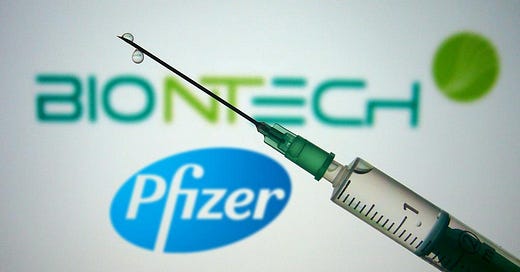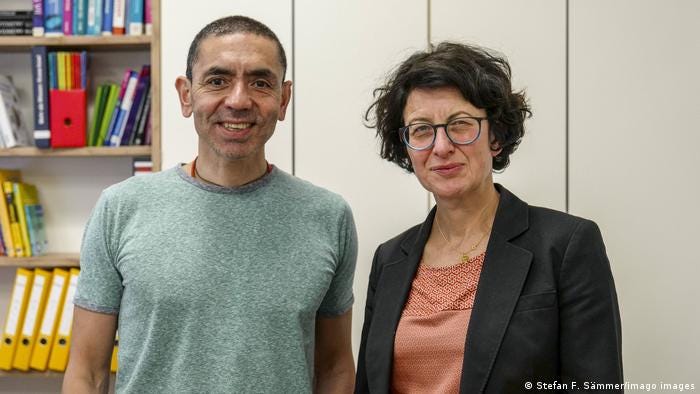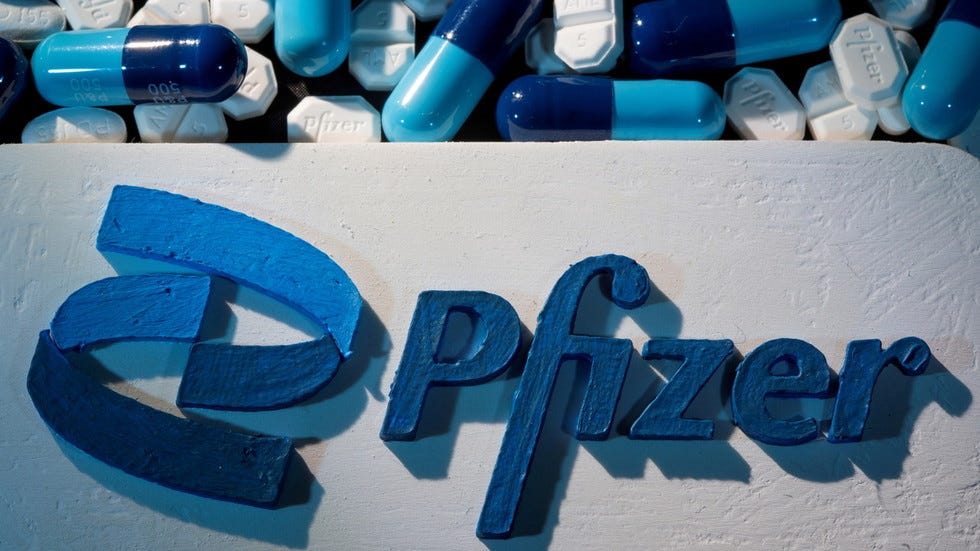What BioNTech reported about its own vaccine to the United States Securities and Exchange Commission
Why is this not being widely reported?
BioNTech made its debut on the Nasdeq in 2019 after signing an agreement with Pfizer. BioNTech co-developed the “Pfizer vaccine” jointly with Pfizer. BioNTech was valued at USD 29 Billion in 2020.
The initial vaccine results were claimed to have an efficacy rate of 95% in people over 65 years in a Phase 3 trial, with no major safety concerns.
All corporations are required to disclose all vital company information in filings to the US Securities and Exchange Commission. This information is for all shareholders and potential investors. Should any of this information be false, shareholders could take legal action against the filing company.
The founders of BioNTech
Below are some excerpts from BioNTech’s FORM 20-F filing, just recently made to the SEC for the fiscal year ending December 31 2020. The link can be accessed here:
https://www.sec.gov/Archives/edgar/data/1776985/000156459021016723/bntx-20f_20201231.htm
Risk Factors Summary
Investing in the ADSs involves various risks. You should carefully read and consider the matters discussed in this Annual Report under the heading “Risk Factors,” which include the following risks:
• Our revenue depends heavily on sales of our COVID-19 vaccine, and our future revenues from our COVID-19 vaccine are uncertain.
• Our commercial revenue is based on preliminary estimates of COVID-19 vaccine sales and costs from Pfizer Inc., or Pfizer, that are likely to change in future periods, which will impact our reported financial results.
• We may not be able to demonstrate sufficient efficacy or safety of our COVID-19 vaccine to obtain permanent regulatory approval in the United States, the United Kingdom, the European Union, or other countries where it has been authorized for emergency use or granted conditional marketing approval.
• We face significant competition with other makers of COVID-19 vaccines and may be unable to maintain a competitive market share for our COVID-19 vaccine.
• We have only recently built our marketing and sales organization. If we are unable to continue to increase our marketing and sales capabilities on our own or through third parties, we may not be able to market and sell our product candidates effectively in the United States and other jurisdictions, if approved, or generate product sales revenue.
• Even if we obtain regulatory approval for our product candidates, the products may not gain the market acceptance among physicians, patients, hospitals, cancer treatment centers and others in the medical community necessary for commercial success.
• Our operating results may fluctuate significantly, which makes our future operating results difficult to predict. If our operating results fall below expectations, the price of the ADSs representing our shares could decline.
• We may require substantial additional financing to achieve our goals, and a failure to obtain this capital on acceptable terms, or at all, could force us to delay, limit, reduce or terminate our product development programs, commercialization efforts or other operations.
• We have in the past identified a material weakness in our internal control over financial reporting and may identify additional material weaknesses in the future that may cause us to fail to meet our reporting obligations or result in material misstatements in our financial statements. If we fail to remediate our material weakness, we may not be able to report our financial results accurately or to prevent fraud.
• As a “foreign private issuer,” we are exempt from a number of rules under the U.S. securities laws, as well as Nasdaq rules, and we are permitted to file less information with the SEC than U.S. companies. This may limit the information available to holders of the ADSs and may make our ordinary shares and the ADSs less attractive to investors.
• We face risks related to health epidemics and pandemics, such as COVID-19, that could adversely affect our operations.
• mRNA drug development has substantial clinical development and regulatory risks due to limited regulatory experience with mRNA immunotherapies.
• Clinical development involves a lengthy and expensive process with an uncertain outcome, and delays can occur for a variety of reasons outside of our control. Clinical trials of our product candidates may be delayed, and certain programs may never advance in the clinic or may be more costly to conduct than we anticipate, any of which can affect our ability to fund our company and would have a material adverse impact on our business.
• Results of earlier studies and trials of our product candidates may not be predictive of future trial results.
• Our mRNA product candidates are based on novel technologies and any product candidates we develop may be complex and difficult to manufacture. We may encounter difficulties in manufacturing, product release, shelf life, testing, storage, supply chain management or shipping. If we or any of the third-party manufacturers we work with encounter such difficulties, our ability to supply materials for clinical trials or any approved product could be delayed or stopped.
• If our efforts to obtain, maintain, protect, defend and/or enforce the intellectual property related to our COVID-19 vaccine or our product candidates and technologies are not adequate, we may not be able to compete effectively in our market.
• We have experienced and may continue to experience significant volatility in the market price of the representing our ordinary shares.
• Our principal shareholders and management own a significant percentage of our ordinary shares and will be able to exert significant control over matters subject to shareholder approval.
Risks Related to our COVID-19 vaccine and the Commercialization of our Pipeline
Our revenue depends heavily on sales of our COVID-19 vaccine, and our future revenues from our COVID-19 vaccine are uncertain.
Our COVID-19 vaccine was granted emergency use authorization in the United States and the United Kingdom, and conditional marketing approval in the European Union, in December 2020, followed by emergency or limited use authorization in a number of other countries and approval for use in certain other countries. Prior to this, we had not sold or marketed any products in our pipeline. As a result, we expect that a majority of our total revenues, and all of our product revenues, in 2021 will be attributable to sales of our COVID-19 vaccine. There is intense competition in the field of COVID-19 vaccines, including with other vaccines that have been authorized for emergency use and those in late-stage clinical development. Our future revenues from sales of our COVID-19 vaccine depend on numerous factors, including:
• competition from other COVID-19 vaccines, including those with different mechanisms of action and different manufacturing and distribution constraints, on the basis of, among other things, efficacy, cost, convenience of storage and distribution, breadth of approved use, side-effect profile and durability of immune response;
• the extent of the spread of COVID-19 infection;
• the extent to which a COVID-19 vaccine continues to be necessary beyond the current pandemic;
• the durability of immune response generated by our COVID-19 vaccine, which has not yet been demonstrated in clinical trials;
• our ability to receive full regulatory approvals;
• our pricing and coverage negotiations with governmental authorities, private health insurers and other third-party payors after our initial sales to national governments;
• the extent to which SARS-CoV-2 mutates and the efficacy of our COVID-19 vaccine in preventing COVID-19 infection from mutated strains;
• the ability of countries and jurisdictions to store and distribute doses of our COVID-19 vaccine to end users at cold temperatures;
• the safety profile of our COVID-19 vaccine, including if previously unknown side effects or increased incidence or severity of known side effects as compared to those seen during clinical trials are identified with our COVID-19 vaccine with widespread global use after approval; and
• our manufacturing and distribution capabilities for our COVID-19 vaccine.
This comes at a time when Denmark is the first country to suspend their mass vaccine campaign due to high rates of vaccination and low number of new infections within the country.
Market pundits expect the stock prices of both companies to tumble later this year.
Subscribe to updates via email:






